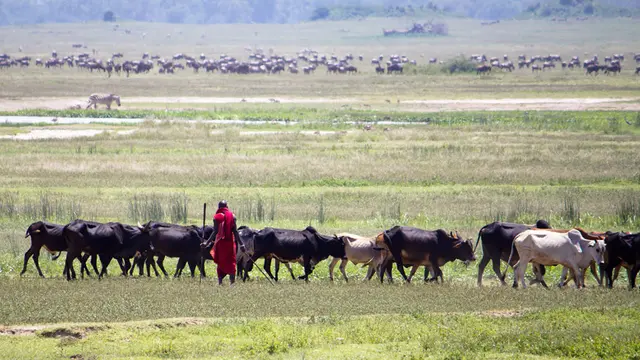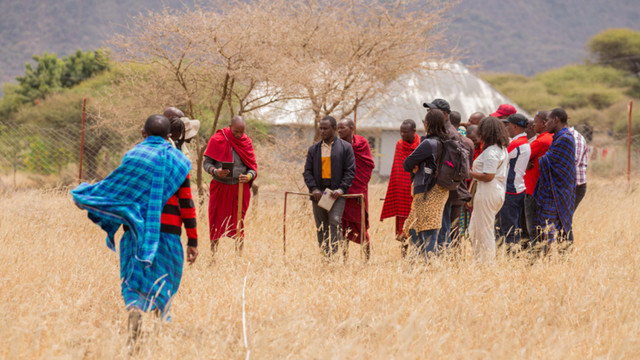Q&A: What’s new about this year’s CBA event?
CBA12 takes place in Malawi next month. We asked the organisers how this year's event will benefit the CBA community of practice.

This year’s CBA event, taking place in Lilongwe, Malawi, will shift from the conference format of previous years, instead combining two-days of hands-on workshops with a further two-days of interactive dialogue. During the workshops, practitioners, facilitators, young people and researchers will share knowledge and experience to develop practical solutions for getting locally-driven climate adaptation into policy and explore innovative ways for financing these solutions. On day one of the dialogue sessions, donors and investors will put these solutions to the test. During the second day of dialogues, government representatives will be sharing their experience and exchanging ideas with event participants on how to integrate locally-driven climate adaptation into national climate plans.
Q: IIED is bringing a new approach to the CBA event this year. What’s different?
A: To be effective, locally-driven climate adaptation (or community-based adaptation – CBA) needs to draw on the energy, expertise and experience of different groups ̶ those working on the ground with communities, policy makers and planners from local and national governments, donors and investors. Over the last ten years, CBA conferences have brought these groups together to build a vibrant community of practice, sharing ideas on how to drive bottom-up action on climate adaptation and how to influence policy that delivers solutions for the poorest people.
But at this year’s event (CBA12), we’re refining our approach. We’re taking on board feedback from partners and past attendees that the event needs to be more interactive, with more hands-on activity. So, we’re shifting from a conference format and creating a workshop environment, where participants will work together to devise tangible, practical solutions for what’s needed to ensure locally driven climate action for resilient development is supported by policy, and is financed.
The focus of this year’s event will be to strengthen the voice of this community of practitioners and build further collaboration. Collectively, this community has the power to make sure effective adaptation approaches are included in National Adaptation Plans, integrated into development plans, and that these approaches are properly funded and can be delivered.
We’ll be looking more closely at when locally-driven climate adaptation works best and who needs to do what to create the optimal conditions – policy, governance and delivery reforms – for effective climate action.
So CBA this year is about creating an interactive space for sharing knowledge and building capacity to harness the full potential of this community of practice, with the ultimate goal of achieving policy influence and increasing climate finance flows to the front line.
Q: What’s on the agenda?
A: Two days of workshops will be followed by two days of multi-stakeholder dialogues. CBA practitioners will have the opportunity to meet and work with policy makers, policy advisers, representatives of social impact investors and private sector stakeholders. Together they will identify ideas and develop proposals for joint initiatives that will build the enabling environment – the policy, delivery and financing capabilities – for locally-driven climate adaptation.
Across all four days, we will be looking at how to ensure meaningful engagement of climate vulnerable communities in decision making and how to enable transformation in gender relations, given the differential impacts of climate on men and women, younger and older, able or disabled.
Market place & Burning issues
During ‘market place’ sessions, participants can present good-practice narratives based on their own experiences.There will also be ‘burning issues’ sessions for the community of practitioners to debate ways to tackle shared challenges and opportunities, such as what combination of approaches will enable transformation, how insights into effective policy, adaptation technologies and investment approaches would work together. The programme will have flexibility built in to respond to the interests and concerns of those present and participants are invited to suggest issues for small group discussions.
Skills clinic
A ‘skills clinic’ will offer participants practical sessions for exchanging knowledge and sharing expertise on topics such as monitoring and evaluation, accessing climate finance, developing proposals and communications. Everyone is invited to come ready to share their skills and learn from each other.
Engaging with young people
We’re also inviting young people to join and bring their experience and insight to our growing community of practice and participate in the whole event.
Q: And what are the themes of this year’s event?
A: The workshop sessions will fall under three areas:
- Transforming 'lived experience' and local knowledge into evidence that drives better policies and investments
- Building a shared understanding of effective devolved climate finance, and
- Innovating in applying adaptation technology.
Q: What’s the aim of the two-day dialogues and who will join?
A: On day three, donors and investors will share knowledge on potential finance flows to adaptation and what investors are looking for. Pitches developed in the workshops will be presented in a ‘dragon's den’– to get feedback and hone their approaches to developing innovative finance channels for climate adaptation. These approaches will be refined later by working groups. An ‘open space’ session will further discussions on ways to support the community of practice.
Regional NAP Expo
Day four will be a Regional NAP Expo ̶ where countries can discuss how they are progressing their National Adaptation Plans and, in particular, how locally-driven climate adaptation is being integrated into these national climate plans. The expo is an outreach event to promote exchange of experiences and foster partnerships between a wide range of actors and stakeholders to exchange ideas and deliberate ways to advance NAPs. All event participants will take part in this exchange.
Q: How will outputs from CBA12 be taken forward to get the policy influence it sets out to achieve?
A: This will be the first in a series of annual events using the new format. Between these events we will seek to support the community of practice to engage, empower and mobilise around a shared agenda – such as via an online platform to facilitate shared learning, networking and collaboration and outputs such as dialogue events or publications targeted at decision makers in key places.
Messages and insights from CBA will be fed into other fora, to build the connections needed to influence thinking. These include the annual Development and Climate Days (D&C Days) during the UN climate negotiations and regional and international learning events on adaptation and to scientific adaptation fora, such as Adaptation Futures.
The CBA events and the platform will enable members of the community of practice to collaborate around knowledge products, funding proposals, around workshops to strengthen capabilities and will connect them with policy makers and potential investors.
We’re excited about bringing these different groups together to engage in this interactive space; we think this year’s CBA has all the right ingredients for promoting locally-driven climate action that can reach scale and for delivering the just transition to climate resilient and low emission development. Join us!
CBA12 takes place in Lilongwe, Malawi from 11-14 June 2018.
Contact
Want to find out more?
If you have any questions about the event or registration, email cbaconference@iied.org.


